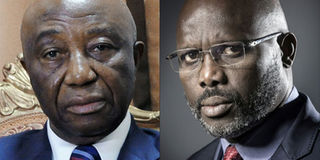Court delays Liberia’s vote hearing till Friday

A photo montage of Liberia Vice President Joseph Nyumah Boakai (L) and former football player and candidate in Liberia's presidential elections, George Weah. AFP PHOTO
What you need to know:
- Liberia emerged from the bloodshed with the election in 2005 of Ellen Johnson Sirleaf -- Africa's first elected woman president.
- Although the October 10 vote was hailed as largely credible by domestic and international observers, they also recorded some irregularities and long delays in voting.
Liberia's Supreme Court has delayed until Friday a hearing on the country's disputed presidential election, increasing the likelihood that an impending runoff vote will be delayed.
A court spokesman told this reporter late Wednesday that the hearing, which will challenge the electoral commission's handling of the first round of the elections on October 10, would not take place on Thursday as planned for procedural reasons.
It will now take place on Friday at 2pm (1400 GMT), the spokesman said on Thursday.
Former international footballer George Weah and incumbent Vice President Joseph Boakai face each other in the November 7 runoff. Neither gained more than 50 percent of votes in the first round.
Boakai has backed a legal complaint lodged by the opposition Liberty Party alleging "massive fraud and irregularities", but has said he is still participating in the runoff.
The Supreme Court found on Tuesday that the country's electoral commission had a case to answer arising from the Liberty Party complaint.
The election is Liberia's first democratic transition in seven decades.
Commentators describe it as a key test of stability after a 15-year nightmare in which an estimated quarter of a million people died in back-to-back civil wars.
Liberia emerged from the bloodshed with the election in 2005 of Ellen Johnson Sirleaf -- Africa's first elected woman president.
She is stepping down after a maximum two six-year terms in which she helped to ease the trauma of conflict but struggled to tackle its grinding poverty.
Attempting to head off the latest crisis, Sirleaf on Wednesday hosted Guinean President Alpha Conde and Togolese leader Faure Gnassingbe, acting in a mediatory role, as well as the electoral protagonists Weah and Boakai.
Conde represents the African Union and Gnassingbe chairs the West African regional economic bloc ECOWAS (Economic Community of West African States).
The goal is to "listen to the various concerns and bring their expertise to bear on the table with a view to resolving those issues", her office said on Wednesday.
In a statement to his supporters issued after meeting, Weah said, "I want to call on all of you to remain calm. We have met the AU and ECOWAS leaders; I can assure you that all is well.
"We are waiting for the Supreme Court to come with its ruling. The democratic battle we started in 2005 we are prepared to finish it, whether it is first round, second round, third round or fourth round."
Although the October 10 vote was hailed as largely credible by domestic and international observers, they also recorded some irregularities and long delays in voting.
But a statement released on Sunday by the Unity, Liberty and All Liberian parties used far stronger terms, saying the election was "characterised by massive systematic irregularities and fraud".
They also said Sirleaf had "interfered" by meeting polling officials ahead of the vote.




